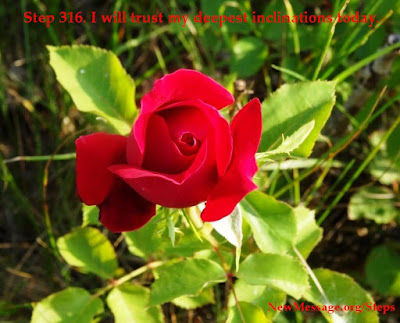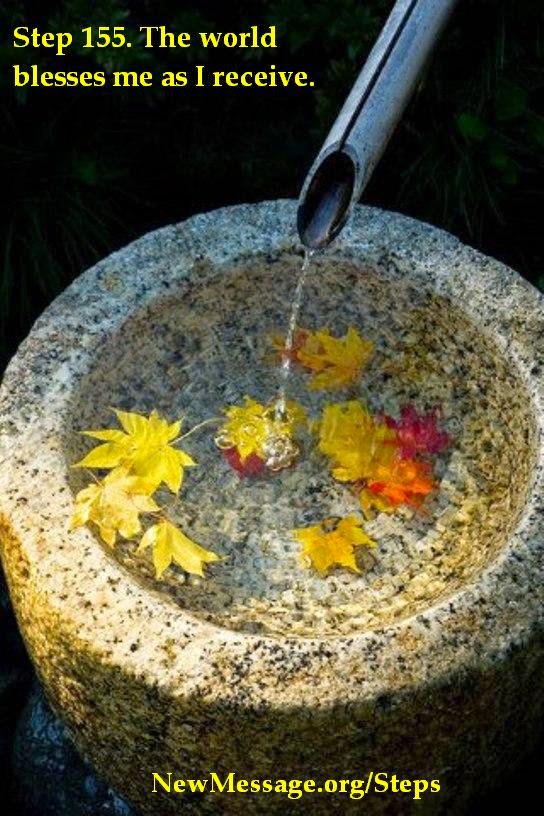Step Two Hundred and Seven
 |
| Light of Forgiveness |
Step 207. I Forgive Those Whom I Think Have Hurt Me.
This statement represents your intention to have Knowledge, for
unforgiveness is merely the application of blame towards a situation in which
you were unable to understand or to apply Knowledge. All your failures are your
own in this respect. This may look like a burden of blame at first, until you
realize the greater opportunity that it presents to you. For if all failures
are your own, then you will realize that all correction is given to you to
apply. The failure of another is not your own, but your condemnation of it is
your own failure. Therefore, any failure that engenders unforgiveness in you is
your failure, for another’s failure need not engender unforgiveness in you or
blame of any kind. In fact, the failures of others will engender your
compassion and the application of Knowledge in the future and need not give
rise to blame or unhappiness within you.
Knowledge is not shocked upon looking at the world. Knowledge is not dismayed. Knowledge is not discouraged. Knowledge is not affronted. Knowledge realizes the smallness of the world and the errors of the world. It realizes this because it only knows itself, and all that is not Knowledge is merely the opportunity for Knowledge to be reapplied. Thus, your unforgiveness is simply the opportunity for you to reapply Knowledge.
Repeat today’s idea upon the hour and do not underestimate its value to you who now seek to be unburdened from grief and misery. In your two deeper practice periods, think of those, one by one, for whom you feel unforgiveness—individuals that you have known personally and individuals that you have heard about or thought of, individuals that have been associated with failure. They will come to mind as you call upon them, for they are all waiting to be forgiven by you. Allow them now to arise one by one. As they do so, forgive yourself for failing to apply your Knowledge. Remind them as they appear to you that you are now learning to apply Knowledge and that you will not suffer on their behalf and they, therefore, need not suffer on yours. The commitment to forgive, then, is the commitment to realize Knowledge and to apply Knowledge, for Knowledge dispels unforgiveness like the light dispels the darkness. For there is only Knowledge and the need for Knowledge. That is all that you can possibly perceive in the universe.
Your two practice periods are, therefore, dedicated to facing those whom you have accused and forgiving yourself for failing to apply Knowledge in your understanding of them and engagement with them. Do this without any form of guilt or self-deprecation, for how could you possibly not fail if Knowledge was not available to you or if you were not available to Knowledge. Accept, then, your former limitations and dedicate yourself now to perceiving the world anew, without blame and with the greatness of Knowledge.
Practice 207: Two 30-minute practice periods. Hourly practice.
Knowledge is not shocked upon looking at the world. Knowledge is not dismayed. Knowledge is not discouraged. Knowledge is not affronted. Knowledge realizes the smallness of the world and the errors of the world. It realizes this because it only knows itself, and all that is not Knowledge is merely the opportunity for Knowledge to be reapplied. Thus, your unforgiveness is simply the opportunity for you to reapply Knowledge.
Repeat today’s idea upon the hour and do not underestimate its value to you who now seek to be unburdened from grief and misery. In your two deeper practice periods, think of those, one by one, for whom you feel unforgiveness—individuals that you have known personally and individuals that you have heard about or thought of, individuals that have been associated with failure. They will come to mind as you call upon them, for they are all waiting to be forgiven by you. Allow them now to arise one by one. As they do so, forgive yourself for failing to apply your Knowledge. Remind them as they appear to you that you are now learning to apply Knowledge and that you will not suffer on their behalf and they, therefore, need not suffer on yours. The commitment to forgive, then, is the commitment to realize Knowledge and to apply Knowledge, for Knowledge dispels unforgiveness like the light dispels the darkness. For there is only Knowledge and the need for Knowledge. That is all that you can possibly perceive in the universe.
Your two practice periods are, therefore, dedicated to facing those whom you have accused and forgiving yourself for failing to apply Knowledge in your understanding of them and engagement with them. Do this without any form of guilt or self-deprecation, for how could you possibly not fail if Knowledge was not available to you or if you were not available to Knowledge. Accept, then, your former limitations and dedicate yourself now to perceiving the world anew, without blame and with the greatness of Knowledge.
Practice 207: Two 30-minute practice periods. Hourly practice.
Here you will find pointers for getting started if this is your first encounter
with this practice: Taking the Steps to
Knowledge.
October 24, 2013 Round One: I have long understood that no one is to blame
for my failures other than myself, my failures are my own, and all the tools
for correcting my failures are in my hands. As for the failures of others, it
is very easy to condemn. Although I may find it easy to forgive at the mental
level, it is often more difficult to do this at the heart level, it takes more
time, more compassion, more awareness.
I have always felt a deep resonance with Jesus’ words, “Forgive them Father, for they know not what they do.” To me this implies that people act the way they do out of ignorance, not because they are inherently evil or malicious, it’s just that they know no better. They have not yet reached a level of higher awareness, they are not with Knowledge. They are not to blame for this, it’s just where they’re at. If I hold this to be true, it is easier not to condemn, but to feel compassion.
I also hold it to be true that people can only hurt me if I let them.
I wish to understand and apply Knowledge in each situation I face, for only with Knowledge can I steer a true course.
I have always felt a deep resonance with Jesus’ words, “Forgive them Father, for they know not what they do.” To me this implies that people act the way they do out of ignorance, not because they are inherently evil or malicious, it’s just that they know no better. They have not yet reached a level of higher awareness, they are not with Knowledge. They are not to blame for this, it’s just where they’re at. If I hold this to be true, it is easier not to condemn, but to feel compassion.
I also hold it to be true that people can only hurt me if I let them.
I wish to understand and apply Knowledge in each situation I face, for only with Knowledge can I steer a true course.
February 25, 2015 Round Two: This Step is full of gems of wisdom.
"The
failure of another is not your own, but your condemnation of it is your own
failure."
This speaks loud and clear to me today.
"In fact, the failures of others will engender
your compassion and the application of Knowledge in the future and need not
give rise to blame or unhappiness within you."
Now, today, I am in a place where I cannot be
hurt by others, for if I am hurt, it is only because I am still not realizing
Knowledge and still not applying Knowledge. And that is my failure. When I
allow Knowledge to manifest itself in my life, all I can feel is compassion for
those who are still hurting, for those who still put the blame on me for their
hurt. I am not to blame, this is not my failure, it is the other person’s failure, and I
pray that they too will reach that place with Knowledge where they realize this
and can forgive.
January 30, 2019 Round Three: I am to apply Knowledge in situations where I have been unforgiving. I am to forgive myself for failing to apply Knowledge. I understand that if anyone has hurt me, it is of my own doing, I have allowed them to do this.



Comments
Post a Comment